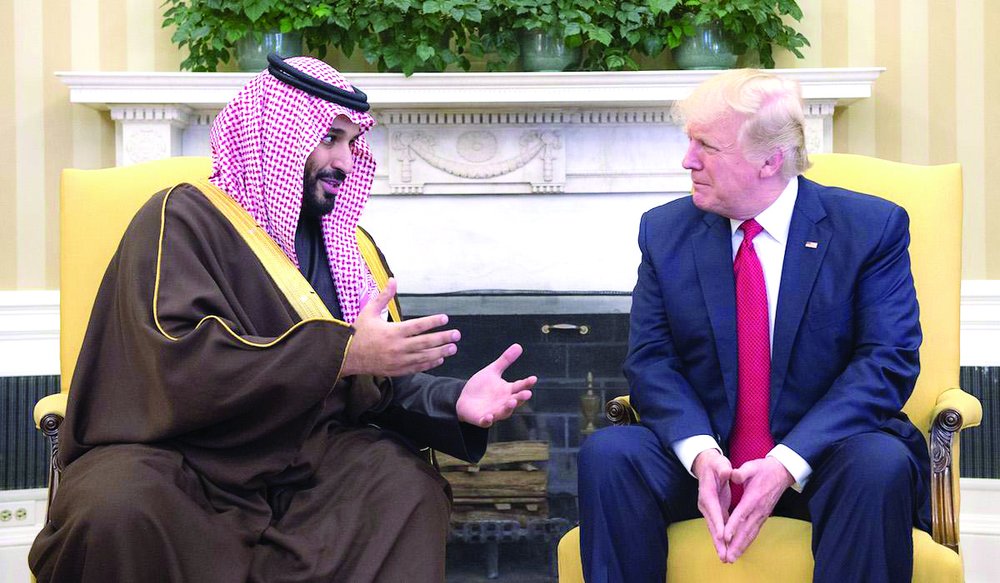Trump should clarify his anti-Muslim position during his trip to Saudi Arabia

At the end of his tenure as the President of the United States, Barack Obama gave a stunning warning about Donald Trump’s election campaign promises.
Its gist was that the Republican candidate would soon face a sobering reality check on his most controversial policies.
President Trump has already reneged on many campaign promises, shifting and softening his position on NATO and China, for example. During a press conference with NATO Secretary General Jens Stoltenberg at the White House, Trump told journalists, “I said NATO was obsolete, it is no longer obsolete.” After suggesting a “relook” at the One China policy, he invited President Xi Jinping to the White House and has sent senior diplomats to China in an attempt to clarify the U.S. position and improve relations.
The sobering reality check continues daily, prompting his trusted advisor Kellyanne Conway to come up with innovative spin to get him out of his self-made mess. It was Conway who came up with the notion of “alternative facts” to minimize the PR damage to the Trump presidency.
Two types of “facts”
According to Trump’s team, there are essentially two types of “facts”; those that were uttered during the presidential campaign and those uttered by the president afterwards. Any of the former which contradict the latter are annulled; presidential utterances take precedence. Controversial at best, this has affected public trust in politics under Trump in the U.S.
Donald Trump’s election campaign was built on two controversial promises: he would build a wall along the U.S. border with Mexico; and institute a blanket ban on Muslims going to America, “until we know exactly what the hell is going on”. Neither has yet seen the light of day. In fact, a somewhat different ban has replaced the latter, with Muslims coming from a selected number of Muslim countries being prohibited from entering the U.S. Trump claims that the strategy was inherited from the Obama administration.
Having passed his first 100 days in office, it has been announced that Trump will make his first visit as president to the Kingdom of Saudi Arabia in July. The decision to visit a Muslim state is contrary to expectations; that it is the home of Islam’s holiest places in Makkah and Madinah and the religious epicenter of the people he wanted to ban from the U.S. has perplexed many observers. Furthermore, “Trump’s visit to Saudi Arabia will include a bilateral summit,” explained Foreign Minister Adel Al-Jubeir, “a meeting with Arab Persian Gulf leaders and another with leaders of Arab and Muslim countries.”
The choice of Saudi Arabia as his first state visit adds to the confusion that is America’s foreign policy toward the Middle East. Those who voted for Trump can be forgiven for interpreting this as a betrayal of the political mandate they thought that they were voting for; he did, after all, use inflammatory anti-Muslim rhetoric to help him to win the presidency.
Notwithstanding what was said about Muslims during the election campaign, though, Trump is warming up to certain leaders in the region. Government-to-government interactions have been cordial and there are a number of ongoing economic negotiations between the U.S. and countries like Saudi Arabia, the United Arab Emirates and Egypt. Moreover, the improved cooperation between Israel, certain Arab states and the U.S. against Iran has added to the regional political complications.
Violations of human rights
The fear amongst many in the Middle East is that such cooperation will normalize relations with Israel despite its continued violations of human rights and military occupation of Palestine. This is an important issue that Trump’s meeting with Arab leaders in Riyadh needs to address. What’s more, the U.S. president should also explain how Arab and Muslim leaders are expected to respond to the anti-Muslim rhetoric in America. How can they address Trump’s support for right-wing politicians in Europe who have heightened anti Muslim sentiments across the continent? Trump’s presidential campaign utilized a number of anti-Muslim stances, so his visit to Saudi Arabia presents an opportunity for him to rebuild the trust that has been shattered.
At the very least, the Arab and Muslim leadership must insist on some sort of reconciliatory sound bite from President Trump while he is in the kingdom. It must contain a message upon which grassroots confidence in the continued relationship with the U.S. can be built.
Failure to do so could further widen the mistrust between the regional governments and their citizens, many of whom believe that their leaders give much more than they get from Washington. A lot of hopes are pinned on the July visit to Saudi as an opportunity for global Muslim concerns about the U.S. to be addressed; clarity on such matters is imperative if progress and stability is to result.
(Source: middleeastmonitor.com)
Leave a Comment